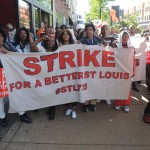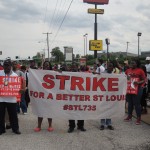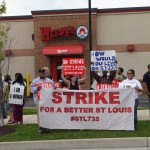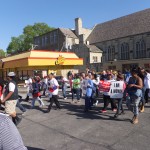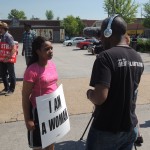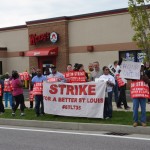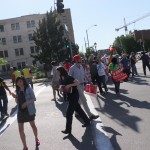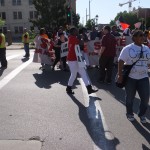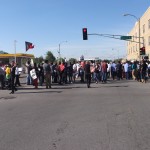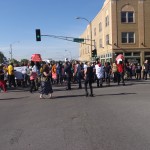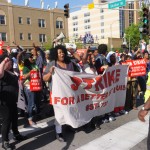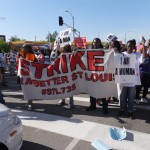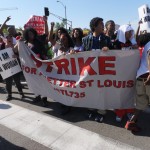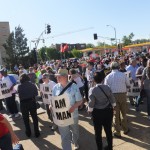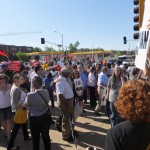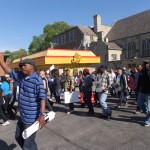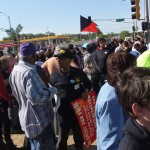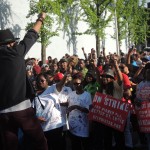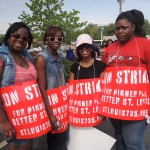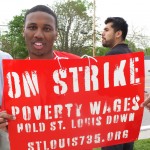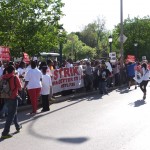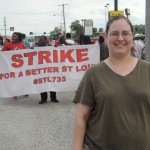First-ever St. Louis fast food walkout calls for $15 hourly wage, job respect, the right to form union without retaliation
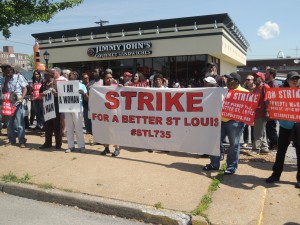
Labor Tribune photo
By TIM ROWDEN
Associate Editor
St. Louis – The campaign by workers who legally struck 30 fast food restaurants last week had its first victory highlighting one of the campaign’s key goals – to win respect for fast food workers as valued employees — when an area manager for Jimmy John’s was removed for publicly humiliating the store’s workers.
The manager’s actions were brought to the public’s attention as a result of the new community campaign supporting fast food workers seeking to win a wage increase, job respect and health care and the right to join a union without fear of retaliation.
In an effort to win a reasonable wage that would give them the ability to support themselves, hundreds of fast food workers across St. Louis walked off the job for two days last week to protest miserable wages, working conditions and unfair treatment. The walkouts came on the heels of similar successful efforts in New York and Chicago, and were followed late in the week by a similar protest in Detroit.
MANAGER REMOVED
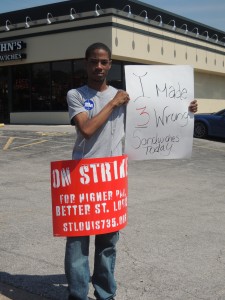
Labor Tribune photo
While the two-day strike in St. Louis of national fast food outlets by more than a hundred fast food workers, joined by several thousands supporters, went without incident, the campaign’s first major victory – at Jimmy John’s – occurred when the campaign exposed the fact that the manager routinely humiliates workers by forcing them to degrade themselves publicly by holding up embarrassing signs:
• After a busy lunch shift, one was made to hold up a sign which read: “I made three wrong sandwiches,” then the manager snapped a picture of him.
• Another worker was made to hold a sign stating, “I was more than 13 seconds in the drive thru.”
• Others are disciplined for trivial incidents with the write-ups displayed publicly.
• Workers are routinely called in to work and then made to go home without pay.
These indignities, coupled with other workplace grievances such as low pay and a lack of benefits, prompted Jimmy John’s employees to join with other St. Louis fast-food workers who walked off their jobs last week.
‘WE’LL BE BACK’
Preceding each strike, a member of the clergy visited with the targeted store managers to inform them of the strike and the workers’ legal right to strike without fear of retaliation.
“Your employees are striking for a living wage. They have a right to do so. We expect no retaliation. If there is, we will be back, in greater numbers,” Dr. Rev. Martin Rafanan told the human resources manager for Wendy’s at the 9604 Manchester store where six workers joined the picket lines.
MAKING THEIR POINT
Outside the Manchester Wendy’s, more than 30 protesters — union members, clergy, community organizations and other fast food company workers — held up protest signs and chanted:
“Hold the burgers, hold the fries. Make my paycheck supersized.”
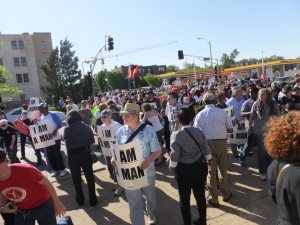
Labor Tribune photo
At the Jimmy John’s in Soulard about 75 protesters chanted:
“Get up. Get down. Fast food workers run this town.”
On West Florissant Ave. in Ferguson, some of the same protesters, traveling across town to join workers at McDonalds chanted:
“Hey, hey, ho, ho, poverty wage has got to go!”
The protesters struck Wendy’s, McDonald’s, Hardee’s, Domino’s, Church’s Fried Chicken and other national fast-food chains.
At the Church’s outlet on Delmar and Skinker, more than 500 protesters lined the sidewalks and for a short time, shut down traffic at the busy intersection. After the protest, they marched west on Delmar to Leland where they held a rally and hip hop concert, with St. Louis DJs and performers, in the street next to Vintage Vinyl.
WORKERS SPEAK OUT
The rally featured workers telling their stories as well as motivating speeches from faith and labor leaders.

One of the workers, Patrick Leeper, 23, said he doesn’t make enough working at the Chipotle in the Delmar Loop to pay his bills and saves money by walking to the MetroLink station to get to work instead of taking the bus. “Why should we have to live life like that?” he asked. “It’s time for change.”
Kenta Jackson, a 21-year-old shift manager at Church’s Chicken, told how even at $8.50 an hour she still has to rely on public assistance to make ends meet.
Jackson said she walked out last week not only for herself, but also for the crewmembers she manages, many of whom

joined her on the makeshift rally stage. “I’m doing it for all of my workers,” she said. “I’m doing this for them.”
MAKING A DIFFERENCE
Bob Soutier, president of the Greater St. Louis Labor Council, told the fast food workers their protest was reminiscent of the early days of the labor movement when the first miner, the first truck driver or the first machinist said, “I’ve had enough.”
“I am so proud when I look out at this crowd and see you
standing up for your rights,” Soutier said.

“You’re creating a change not only in the fast food industry, in the jobs you represent, but in the labor movement and in the City of St. Louis and in St. Louis County. We’re making a change and you all are going to make a difference.”
Rev. Frederick MucCullough of the Wayman AME Church told the workers that they had joined a movement in the tradition of Rosa Parks, the civil rights activist whose simple act of defiance against racial segregation in Montgomery, AL, ignited the Montgomery Bus Boycott.

“Today, you’re going to make a difference in this history of this country,” McCullough said. “Today, your children are going to be able to look up to you and say ‘That was my mama, that was my father that was able to step up for me.’ ”
FORMING NEW UNION
To help low wage workers have their voices heard, a new independent union — the St. Louis Organizing Committee formed— an independent union for fast food workers.
“St. Louis can’t survive on $7.35,” seeks a $15 an hour wage, respect for workers on the job and the right to form a union without retaliation.
Fast food workers bring an estimated $1 billion a year into St. Louis’ economy, yet most of these workers earn Missouri’s minimum wage of $7.35, or just above it, and are forced to rely on public assistance programs to provide for their families and get healthcare for their children.
“ These workers are joining together for $15 per hour and the right to form a union so they can support their families, and put money back into the economy,” said Rev. Rafanan.

“This is a fight we have to be involved in,” said Van Simpson, president of UAW Local 2250 in Wentzville, one of the dozens of unions supporting strikers at the rally. “These are people trying to lift themselves by their bootstraps, earn a decent living, raise a family and have a little quality of life.”
He noted that because the wage is so low, “too many are still on welfare, need food stamps while trying to work 40 hours a week, if the employer gives them 40 hours, which most don’t do. We can’t be doing this in America!”
MISCONCEPTION
Putting a common misconception to rest that fast food workers are only young people in high school trying to earn a few bucks, Soutier noted that the “average age of a fast food worker is now 30 years old.
“This is like the start of the labor movement all over again,” Soutier said as he marched with the protesters.
“They need to know that the labor movement has joined with the faith community and others to support their efforts.”
Adding that their wages are at the bottom now, “The only way is up. We are proud of them standing up for their rights,” Soutier added.
WORKERS JOINING TOGETHER
The strikes by low-wage workers began on Black Friday back in November, with hundreds of Walmart workers walking off their jobs. It spread weeks later to fast food, with workers in Chicago and New York embarking on the first-ever strike to hit this industry.
Low-wage jobs have accounted for the bulk of new jobs added in the recovery, and fast food jobs are among the fastest growing in St. Louis. Workers here, like those around the country, are increasingly joining together to fight for higher wages that will lift themselves out of poverty and help their local economies.
COMMUNITY COALTION
Supporting the fast food workers is a coalition of community, labor and faith-based groups including:
• Faith groups: Adorers of the Blood of Christ, Aquinas Institute, Ascension Episcopal, Bethel Lutheran, Central Reform Congregation, Eden Seminary, Epiphany UCC, Episcopal Diocese, Gethsemane Lutheran Church, Kirkwood UCC, New Life Evangelistic Center, Parkway United Church of Christ, Presbyterian Church USA, St John’s Catholic Church, St John’s Episcopal, St Joseph’s Catholic Church, St. Margaret of Scotland, St. Mark Lutheran, St. Peter’s United Church of Christ, St. Pius, St Thomas United Church of Christ, United Church of Christ in Affton, Wayman African Methodist Episcopal Church, Westminster Presbyterian and Westside Baptist Young Activists United.
• Unions: Greater St. Louis Labor Council, AFSCME Illinois Council 31, Coalition of Black Trade Unionists, Laborers Local 110, SEIU Health Care, SEIU Local 1, Teamsters Local 688, United Food and Commercial Workers 655, Meatcutters Local 88 and National Nurses United.
• Community groups: ACTION, ARAW, Jobs with Justice, Families USA, Jobs with Justice Workers’ Right Board, Missouri Jobs with Justice, , MO Health Care For All, MORE, PROMO, The Bridge at Newtown, and ProVote.

Please sign on
Jimmy John’s worker starts on-line support petition
“I walked off my job at Jimmy John’s this morning because I can’t survive on the poverty wages I make.”
With that comment, St. Louis fast food worker Rasheen Aldridge, 19, a student at Forest Park Community College, took advantage of social media to launch an on-line petition campaign via STL735.org to build pressure in America to encourage the wealthy food companies to pay their employees a living wage, respect on the job and health care.
“The companies we work for aren’t paying us enough to support our families – despite huge corporate profits,” he stressed. “We need higher pay. We need to be treated fairly at these jobs, because we’re treated like crap,” Aldridge said. “You’re just like a number in fast food.”
In announcing his petition, Aldridge said, “Most of us make $7.35 an hour – Missouri’s minimum wage – or just barely more (he makes $8 an hour). That means our average salary is less than $19,000 per year, which just isn’t enough to cover basic needs like rent, food, health care, transportation, and often times a family to support. A lot of us are forced to rely on public assistance to make ends meet.
“It’s downright shameful that someone who works full time is forced to rely on public assistance because their employers aren’t paying us enough.
“Paying fast food workers a livable wage will not only help us support our families, but it will also help strengthen St. Louis’s entire economy. When we’re paid a fair wage, we’ll have money to buy the everyday items we need, keeping the money in our community and making our neighborhoods safer.”
YOU CAN HELP
If you want to help fast food workers, you can show your support by signing Aldridge’s petition; go to STL735.org; follow #STL735; or like facebook.com/STL735 .
IMAGES OF FAST FOOD WORKERS’ STRIKE


